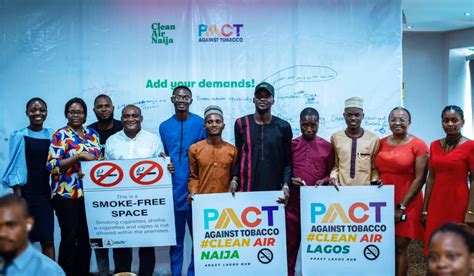The Protecting and Activating Communities Against Tobacco (PACT) Lagos hub, has described as vastly insufficient the recent increase in the National Tobacco Fund from N4.7M to N10m in the budget.
The National Tobacco Control Fund (NTCF) is a financial mechanism established under the National Tobacco Control Act of 2015. Its primary purpose is to provide funding for the implementation and enforcement of tobacco control measures in Nigeria. These measures include efforts to reduce tobacco use, prevent related health issues, and comply with the World Health Organization’s Framework Convention on Tobacco Control (WHO FCTC), to which Nigeria is a party.
The PACT Project Lead, George Adjete lamented the increase, stating strongly that the amount remains woefully inadequate to tackle the widespread challenges of Tobacco use in Lagos, least of all the whole of Nigeria.
The Tobacco Control advocate criticized the ongoing advertisement of tobacco products, citing online promotion of flavoured products such as Shisha, which are misleadingly marketed as less harmful alternatives, adding that children are frequently exposed to these products in retail environments, increasing the risk of early addiction.
The World Health Organization reports that tobacco use causes more than 29,000 preventable deaths each year in Nigeria. Furthermore, the 2012 Global Adult Tobacco Survey found that around 4.5 million Nigerians aged 15 and older use tobacco products.
Adjete urged government at all levels to prioritize funding for tobacco control programmes, while calling on the federal government to increase budget allocations further.
“The Lagos state government has domesticated the National Tobacco Control Act through the Lagos No Smoking Law, 2014, which prohibits smoking in public places, including schools, hospitals, and public transport”, Says Adjete. “Despite this, enforcement remains weak, and awareness levels are still low”.
“Sadly, many public spaces in Lagos still permit smoking, while others allow the use of shisha, exposing non-smokers to harmful secondhand smoke, which contains over 7,000 chemicals, including 70 known carcinogens. The dangers are clear, and without increased funding and enforcement, public health will continue to suffer,” he lamented.








Oh my goodness! an incredible article dude. Thank you However I’m experiencing challenge with ur rss . Don’t know why Unable to subscribe to it. Is there anybody getting similar rss problem? Anyone who knows kindly respond. Thnkx
Can you tell us morde about this? I’d wantt too find out moee details.
I waas able to fknd good info from your blpog articles.
Awesomme issues here.I amm very glad too look yoyr article.
Thank you so much and I’m looking forrward to contact you.
Wiill you kinddly drop me a mail?
I wilpl immesiately seize your rss as I can’t to find your ejail subscription link or e-newsletter service.
Do you’ve any? Plese let mme recognise iin ordeer that I mmay just subscribe.
Thanks.
Your style is so unique compaeed to other peopple I’ve read stuff from.
I appreciate yyou foor posting wheen youu have thhe
opportunity, Guss I wilol jut bookmark this site.
1pnu7b
nmv6td
A powerful share, I just given this onto a colleague who was doing just a little analysis on this. And he in reality purchased me breakfast as a result of I found it for him.. smile. So let me reword that: Thnx for the treat! However yeah Thnkx for spending the time to discuss this, I really feel strongly about it and love studying extra on this topic. If doable, as you turn out to be experience, would you thoughts updating your blog with extra details? It’s highly useful for me. Large thumb up for this weblog submit!